二年级英语下册《Unit_10》(人教新起点)
- 格式:ppt
- 大小:2.32 MB
- 文档页数:28
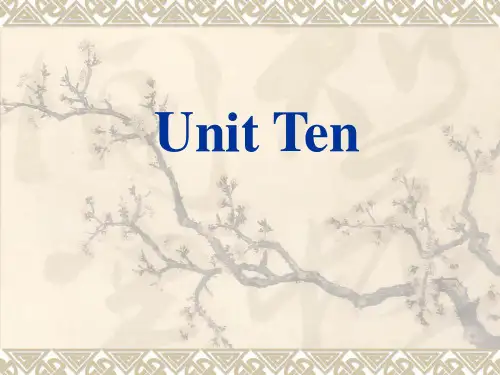
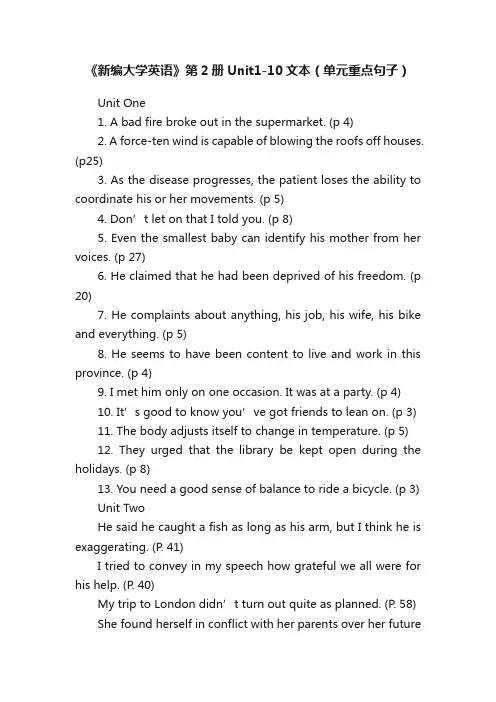
《新编大学英语》第2册Unit1-10文本(单元重点句子)Unit One1. A bad fire broke out in the supermarket. (p 4)2. A force-ten wind is capable of blowing the roofs off houses. (p25)3. As the disease progresses, the patient loses the ability to coordinate his or her movements. (p 5)4. Don’t let on that I told you. (p 8)5. Even the smallest baby can identify his mother from her voices. (p 27)6. He claimed that he had been deprived of his freedom. (p 20)7. He complaints about anything, his job, his wife, his bike and everything. (p 5)8. He seems to have been content to live and work in this province. (p 4)9. I met him only on one occasion. It was at a party. (p 4)10. It’s good to know you’ve got fr iends to lean on. (p 3)11. The body adjusts itself to change in temperature. (p 5)12. They urged that the library be kept open during the holidays. (p 8)13. You need a good sense of balance to ride a bicycle. (p 3)Unit TwoHe said he caught a fish as long as his arm, but I think he is exaggerating. (P. 41)I tried to convey in my speech how grateful we all were for his help. (P. 40)My trip to London didn’t turn out quite as planned. (P. 58) She found herself in conflict with her parents over her futurecareer. (P. 40)She just managed to hold back her anger. (P. 51)The book’s title misled me into thinking that it was a love story, but it was about cars. (P. 42)The children had an argument over what game to play. (P. 40) The idea rapidly gained acceptance in political circles. (P. 39) The power of speech distinguishes human beings from animals. (P. 50)Unit ThreeIn the face of great difficulty, she managed to keep her sense of humor.John has a very rigid attitude to the way he works.None of these social problems is unique to this country.That book is beyond the capacity of children who are still learning to read.That’s a remarkable achievement for some so young.The course will cover a whole range of topics.We won four games in succession.You need to channel your energies to something useful.Unit Four1. Profits have declined as a result of the recent drop in sales.2. A doctor writes the prescription and a chemist makes it up for you.3. Both your fears and your behavior are irrational.4. Despite her father’s reassurance she was still frightened of the dark.5. He wants to transfer some money to the account of his daughter.6. Her interest in flowers stems from her childhood in the country.7. Her views are backed up by the new scientific discovery.8. She cited three reasons why people get into debt.9. She’s become addicted to love stories.10. The judge reacted angrily to the suggestion that it hadn’t been a fair trial.11. The pub has recently extended its opening hours.12. To our great relief, the children all arrived home safely.Unit Five1. The students felt relieved when their teacher said that the mid-term examination was cancelled. (p 151)2. Classes will be called off on Thursday and Friday. (p 155)3. One’s conscious motives are often different from one’s subconscious ones. (p 141)4. Scientists have been working on methods to predict earthquakes. (p143)5. The castle dates back to the 14th century. (p 144)6. The dictionary is the largest volume on that shelf. (p 144)7. The teacher corrected the errors in Bill’s term paper. (p 141)8. When I heard the good news, I trembled with excitement. (p 154)Unit Six1. Our high living standards cause our population to consume25% of the world’s oil. (词P.192,句子课外)2. She is a very effective teacher. (词P.193, 句子课外)3. It’s impractical to have so many people all try to use this equipment at the same time. (词P.193, 句子课外)4. An English-language version of the book is planned for the autumn. P.1965. If you need advice, you have only to pick up the phone, orcome to see us. P.1846. My mother still regards me as a child. P.1847. People often underestimate the importance of the training. P.1958. The farmers fertilize their farmlands. (词P.182, 句子课外)9. The food was fairly good and the portions were sufficiently large to please the men. P.18310. This box holds the sacred relics of a saint. P.183Unit 71. He was sent on over 200 missions before being killed in action. (P229)2. It would be very hard to surpass this very high score. (P 230)3. Mother assured us that everything would be alright. (P227)4. Some of the staff are apt to arrive late on Mondays. (P239)5. The industrial revolution modified the whole structure of English society. (P 229)6. The meeting broke up in great confusion. (P242)7. Unfortunately the report was prepared in haste and contained several inaccuracies. (P 228)8. Where did you pick up English? (P 184)9. With regards to future oil supplies, the situation is uncertain. (P 231)10. You weren’t boring me.On the contrary, you were interesting me. (P 242)11. The form cannot be signed by anyone other than yourself. (P.250) Unit 8The game was all but over by the time we arrived. (P. 267)Before you depart, let me give you a word of advice. (P. 263) Do genes govern all characteristics of an individual? (P. 264)He gave his some money for the purchase of his school books. (P. 266)Her correspondence with Jim lasted many years. (非本册单词)I hated practicing, but I stuck to it, and now I can play pretty well. (P. 287)I love champagne but it’s not often I can indulge myself. (P. 276)If you don’t patent you inventions, someone might steal your idea. (P. 265)If you have any information concerning the recent accident, please call the police. (P. 275)Mick closely resembled his father. (P. 286)She anxiously scanned the faces of the men leaving the train in the hope of finding her husband. (P. 286)She came up with a new idea for increasing sales. (P. 287)She feels obliged to be nice to Jack because he’s her boss. (P. 285)The car reached speeds in excess of 100 miles per hour. (P. 275)The Jackson family had occupied this apartment for the past six months. (P. 276)X-rays have confirmed that he has not broken any bones. (P.263)Unit 9\A campaign was conducted for equal rights.After some consideration, we have decided to sell the house.All their arrangements should be completed prior to your departure.British weather can never be relied on---it is always changing.Cars were still something of a novelty at the beginning of the century.He gives us a lot of trouble--- but I like him all the time.Her speech made tremendous impact on everyone.He is accused of murder.I perceived a note of unhappiness in her voice.More vehicles are prohibited from driving in the town center.The world’s wealth is not fairly distributed between men and women.We failed utterly to convince him.He read rapidly but did not digest anything.The discussions stimulated a free exchange of our ideas.I was pacing back and forth while I waited for the news.In theory, things can only get better. In practice, they may well become a lot worse.What may you suspect her of having taken the money?Unit101. Charities such as Oxfam are always trying to recruit volunteers to help in theirwork. P.3592. National poverty was aggravated by rapid population growth. P.3553. Some people find that certain foods trigger their headaches. P.3604. Surgical techniques are constantly being refined. P.3595. That is a very substantial improvement in the present situation. P.3606. There has to be a clear assessment of the country’s social needs. P.3567. All the members of the team come from totally diversebackground. (词P.344,句子课外)8. What can we do to reverse the present trend of falling sales? (词P.346,句子课外)9. Hard work is fundamental to his success. (词P.367,句子课外)10. He is not able to cope with the difficulties of his new position. (词P.370,句子课外)11. He was labeled a beggar by the local people because of his clothing. (词P.368,句子课外)12. The dream had distressed her greatly. (词P.367,句子课外)。
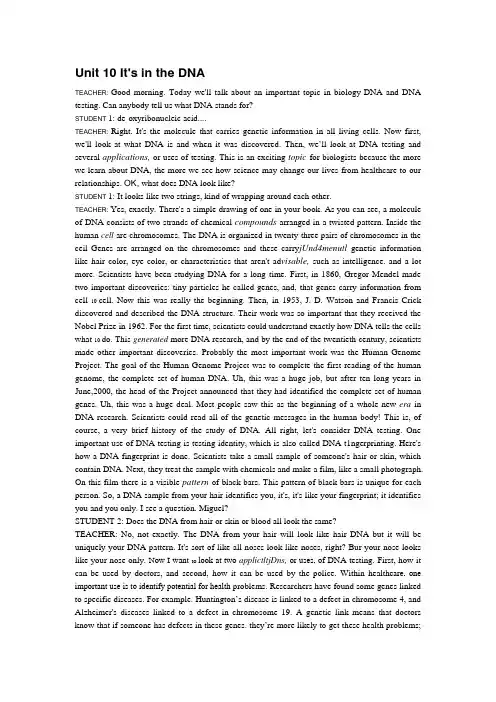
Unit 10 It's in the DNATEACHER: Good morning. Today we'll talk about an important topic in biology-DNA and DNA testing. Can anybody tell us what DNA stands for?STUDENT 1: de-oxyribonucleic acid....TEACHER: Right. It's the molecule that carries genetic information in all living cells. Now first, we'll look at what DNA is and when it was discovered. Then, we’ll look at DNA testing and several applications, or uses of testing. This is an exciting topic for biologists because the more we learn about DNA, the more we see how science may change our lives-from healthcare to our relationships. OK, what does DNA look like?STUDENT 1: It looks like two strings, kind of wrapping around each other.TEACHER: Yes, exactly. There's a simple drawing of one in your book. As you can see, a molecule of DNA consists of two strands of chemical compounds arranged in a twisted pattern. Inside the human cell are chromosomes. The DNA is organized in twenty-three pairs of chromosomes in the ceil Genes are arranged on the chromosomes and these carry jUnd4menutl genetic information like hair color, eye color, or characteristics that aren't ad visable, such as intelligence. and a lot more. Scientists have been studying DNA for a long time. First, in 1860, Gregor Mendel made two important discoveries: tiny particles he called genes, and, that genes carry information from cell 10 cell. Now this was really the beginning. Then, in 1953, J. D. Watson and Francis Crick discovered and described the DNA structure. Their work was so important that they received the Nobel Prize in 1962. For the first time, scientists could understand exactly how DNA tells the cells what 10 do. This generated more DNA research, and by the end of the twentieth century, scientists made other important discoveries. Probably the most important work was the Human Genome Project. The goal of the Human Genome Project was to complete the first reading of the human genome, the complete set of human DNA. Uh, this was a huge job, but after ten long years in June,2000, the head of the Project announced that they had identified the complete set of human genes. Uh, this was a huge deal. Most people saw this as the beginning of a whole new era in DNA research. Scientists could read all of the genetic messages in the human body! This is, of course, a very brief history of the study of DNA. All right, let's consider DNA testing. One important use of DNA testing is testing identity, which is also called DNA t1ngerprinting. Here's how a DNA fingerprint is done. Scientists take a small sample of someone's hair or skin, which contain DNA. Next, they treat the sample with chemicals and make a film, like a small photograph. On this film there is a visible pattern of black bars. This pattern of black bars is unique for each person. So, a DNA sample from your hair identifies you, it's, it's like your fingerprint; it identifies you and you only. I see a question. Miguel?STUDENT 2: Does the DNA from hair or skin or blood all look the same?TEACHER: No, not exactly. The DNA from your hair will look like hair DNA but it will be uniquely your DNA pattern. It's sort of like all noses look like noses, right? Bur your nose looks like your nose only. Now I want to look at two applictltjDns, or uses, of DNA testing. First, how it can be used by doctors, and second, how it can be used by the police. Within health care, one important use is to identify potential for health problems. Researchers have found some genes linked to specific diseases. For example. Huntington’s disease is linked to a defect in chromosome 4, and Alzheimer's diseases linked to a defect in chromosome 19. A genetic link means that doctors know that if someone has defects in these genes. they’re more likely to get these health problems;their potential is increased. Notice, I didn’t say "Researchers have found that some gene defects cause specific diseases." There is simply a link. After doctors perform DNA testing, they can then decide the best way 10 use the information. For example, they may give medication to a patient to prevent a disease from ever starting. Genetic testing can also be used to decide which medicine to give someone. This is called targeted medicine. To me, this is very exciting and promising. There are tiny differences in DNA from person to person. These differences can affect which patients will be helped by a drug, and who may be harmed by it. This is, uh, a tremendous advantage. [t saves lives and money. NOW, let's look at how DNA testing is used by police. The police can use DNA fingerprints to identify and frau criminals. All they need is a small amount, or trace, of blood or hair from the crime scene. if the DNA samples from the crime scene and the suspect match, the results, at least in the United States, can be used as evidence in court. So, DNA testing can be used 10 help put someone in prison. In much the same way, DNA testing can be used 10 help innocent people in prison. People in prison can now try to use DNA testing for crimes that happened, say, ten years ago. If their DNA fingerprint doesn’t match the DNA fingerprint from the crime scene, this can help them get a new trial and perhaps get them out of prison. As you can see, there are benefits to DNA testing. However, there are also some concerns that this type of information might be used against us in the future. Now let's consider how DNA testing could be used against you. What if a company you wanted to work for asked you to take a DNA test? And what if your DNA test showed that you had a gene defect linked to a certain type of cancer? Would the company decide not to hire you? People also worry about health insurance. They’re afraid they might not be able to get health insurance if their DNA test shows they're at a higher risk for certain diseases. As a result, in the United States, some laws have been passed to protect the privacy of medical records. Now DNA testing has other possibilities that we won’t discuss today. But in any case, many people think about the negative uses of testing-the fear that it will be used against people or to create "perfect" babies. Others think about police being able to trace criminals and possible advances in healthcare. But, another way 10 think about it is that it tells us more about who we are, and that's the goal of biology-to understand nature.[ guess ['II stop there for Toady. [n the next class, I want to talk in more depth about uses of DNA testing by doctors. OK, we'll start there next time. That's, uh, that's all for today.。
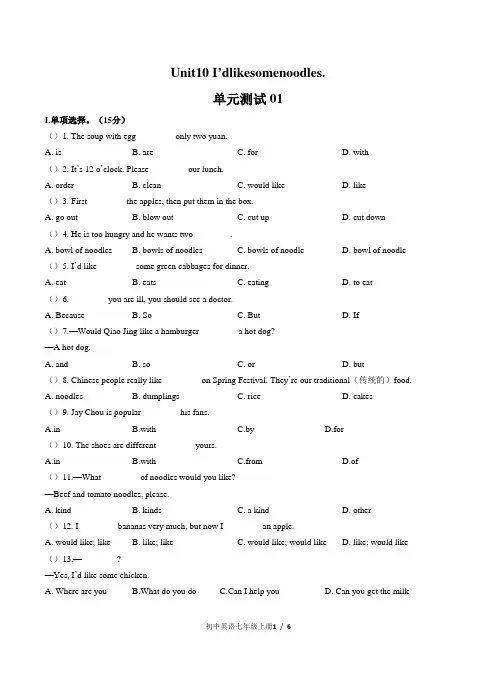
Unit10 I’dlikesomenoodles.单元测试01I.单项选择。
(15分)()1. The soup with egg ________ only two yuan.A. isB. areC. forD. with()2. It’s 12 o’clock. Please ________ our lunch.A. orderB. cleanC. would likeD. like()3. First ________ the apples, then put them in the box.A. go outB. blow outC. cut upD. cut down()4. He is too hungry and he wants two ________.A. bowl of noodlesB. bowls of noodlesC. bowls of noodleD. bowl of noodle ()5. I’d like ________ some green cabbages for dinner.A. eatB. eatsC. eatingD. to eat()6. ________ you are ill, you should see a doctor.A. BecauseB. SoC. ButD. If()7.—Would Qiao Jing like a hamburger ________ a hot dog?—A hot dog.A. andB. soC. orD. but()8. Chinese people really like ________ on Spring Festival. They’re our traditional(传统的)food.A. noodlesB. dumplingsC. riceD. cakes()9. Jay Chou is popular ________ his fans.A.inB.withC.byD.for()10. The shoes are different ________ yours.A.inB.withC.fromD.of()11.—What ________ of noodles would you like?—Beef and tomato noodles, please.A. kindB. kindsC. a kindD. other()12. I ________ bananas very much, but now I ________ an apple.A. would like; likeB. like; likeC. would like; would likeD. like; would like ()13.—________?—Yes, I’d like some chicken.A. Where are youB.What do you doC.Can I help youD. Can you get the milk()14. She’d like tomato noodles. “She’d”means ________A. She wouldB. She needC. She hadD. She will()15.—May I ________ your order?—Yes, I want chicken soup.A. takeB. bringC. likeD. cookⅡ.完形填空。
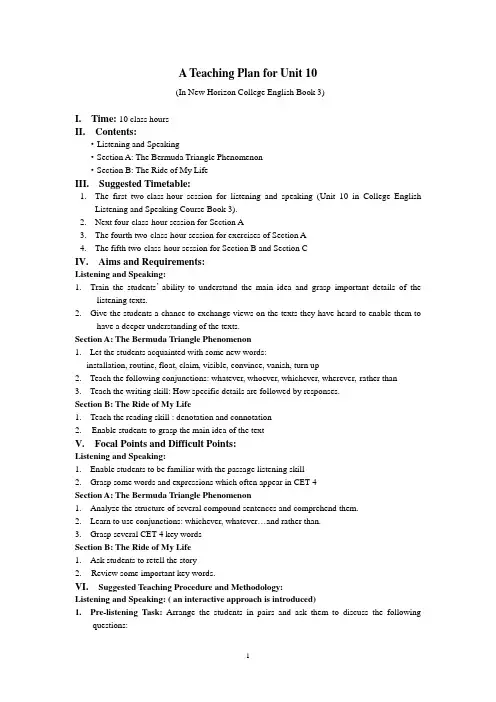
A Teaching Plan for Unit 10(In New Horizon College English Book 3)I. Time:10 class hoursII. Contents:·Listening and Speaking·Section A: The Bermuda Triangle Phenomenon·Section B: The Ride of My LifeIII. Suggested Timetable:1.The first two-class-hour session for listening and speaking (Unit 10 in College EnglishListening and Speaking Course Book 3).2.Next four-class-hour session for Section A3.The fourth two-class-hour session for exercises of Section A4.The fifth two-class-hour session for Section B and Section CIV. Aims and Requirements:Listening and Speaking:1. Train the students’ability to understand the main idea and grasp important details of thelistening texts.2. Give the students a chance to exchange views on the texts they have heard to enable them tohave a deeper understanding of the texts.Section A: The Bermuda Triangle Phenomenon1.Let the students acquainted with some new words:installation, routine, float, claim, visible, convince, vanish, turn up2.Teach the following conjunctions: whatever, whoever, whichever, wherever,rather than3.Teach the writing skill: How specific details are followed by responses.Section B: The Ride of My Life1. Teach the reading skill : denotation and connotation2.Enable students to grasp the main idea of the textV. Focal Points and Difficult Points:Listening and Speaking:1. Enable students to be familiar with the passage listening skill2. Grasp some words and expressions which often appear in CET-4Section A: The Bermuda Triangle Phenomenon1. Analyze the structure of several compound sentences and comprehend them.2. Learn to use conjunctions: whichever, whatever…and rather than.3. Grasp several CET-4 key wordsSection B: The Ride of My Life1. Ask students to retell the story2.Review some important key words.VI. Suggested Teaching Procedure and Methodology:Listening and Speaking: ( an interactive approach is introduced)1. Pre-listening Task:Arrange the students in pairs and ask them to discuss the followingquestions:①How do you define humor?②What does having a sense of humor mean?③What kind of person would you describe as having no sense of humor?2.Background Information:Different people have different definitions of humor. In general it refers to something that is funny or amusing and covers a wide range of types including anecdotes, caricature, irony, jokes, puns, and satire. To many people, real humor always consists of wit. They think true humor should go beyond mere fun and laughter and make people think. While there is no agreed definition on humor, its value to human life is hardly questioned. Humor is a perfect antidote to stress. Research has found that laughter can lower blood pressure and promote the body’s immune system. Besides its health benefits, humor also plays a positive role in public speaking, interpersonal relationships and other areas of our life.3.Listening to text 1 and 24.Speaking Tasks: ask the students to get into pairs and explain to them how to carry outSpeaking Task A- Reflections on the texts, then select a pair to present their views in class.Section A The Bermuda Triangle Phenomenon1. Background Information:①Christopher ColumbusGenoese navigator and explorer for Spain, who explored Caribbean islands, coast of Central America, South America, etc.②Charles BertlitzOne of the world’s foremost authorities on natural mysteries and the author of many famous books, including the highly successful Mysteries of the Forgotten Words and The Mystery of Atlantis.2. Pre-reading ActivitiesListen to short passage twice and answer questions①Have you ever heard of the Bermuda Triangle? What have you heard about it?②What are the possible explanations for the disappearances?③What is your theory of why things disappear? Where do you think they go and why do they gothere?听力原文:Several theories are brought forth in this article to try and explain the Bermuda Triangle phenomenon. It is called a phenomenon because very strange occurrences have taken place at almost the identical point and they happed over several occasions in an extended period of history. How accurate are the reports? Maybe there is a logical explanation for the disappearances. Were the airplane pilots confused because the ocean water can look like glass and reflect the blue sky so the pilots started climbing to get altitude and flew directly into the ocean? Did their compass get magnetically changed and they then flew out to sea when they thought they were flying back to land? Or was it a giant being from outer space making them disappear?Answers:①Have you ever heard of the Bermuda Triangle? What have you heard about it?Open to free discussion.②What are the possible explanations for the disappearances?Several theories are brought forth in this article to try and explain the Bermuda Triangle phenomenon. No theories is a definite answer to the phenomenon.③What is your theory of why things disappear? Where do you think they go and why do they gothere?Open to free discussion.3.Work on Section AA) Structure of the Text ( a method of analyzing the text structure is employed)AbstractThis article introduces a series of mysterious disappearances of ships and airplanes in Bermuda Triangle which aroused people’s curiosity and the researches having been made and to be made.Part One (Paras 1-2)What and where is the Bermuda Triangle, where ships and airplanes vanished mysteriously?Part Two (Paras 3-8)With more incidents of disappearance of ships and airplanes, people and government took great interests in searching for the causes of the mysterious vanishing. Many theories are presented, which are all examined by Charles Berlitz.Part Three (Paras 9)An institute is calling for a further research.B) Raise some questions to make students grasp some detailed information in the text(question and answer method is used)Part I (Paras. 1-2):Questions:1. Why did the five Navy aircraft take off? And what was the weather like?They took off on a routine training mission over the Atlantic Ocean. The weather was fine(perfect flying weather).2. What happened to the five aircraft and rescue plane?They all disappeared without trace3.How do sailors describe the Bermuda Triangle?They describe it as “the Graveyard of the Atlantic”.4.What did Columbus note when he entered the Bermuda Triangle?He noted curious glowing streaks of “white weather”.Part II (Paras. 3-8)Questions:5.Is there any reasonable explanation to date has been made for the vanishings?None of those investigation has produced convincing answers to the mystery.6.What did the captain of Ellen Austin do when he discovered a small sailing ship floatingcrewless?He installed a new crew to sail it.7.What happened to the small sailing ship then?It vanished together with the new crew in the end.8.Why does the U.S. Navy not recognize the triangle as a danger zone?Because it believes that “the majority of disappearances in the triangle can be attributed to the unique features of the area’s environment.”9.How many books are specifically mentioned in the text that are devoted to the investigationof the Bermuda Triangle?Only two: The Devil’s Triangle by Richard Winer and The Bermuda Triangle by Charles Bertlitz.10. What do Richard Winer and Charles Berlitz say about the mysterious disappearances of theplanes and ships?Richard believes that the disappearances are due to men’s mistakes, mechanical problems, strange weather, or unusual magnetic phenomenon, while Charles offers the theory that a giant solar crystal that lies on the ocean floor causes the disappearances.Part III (Para. 9)Questions:11.The last paragraph tells us that an institute is calling for a further research. Do you think the300 psychics and scientists will find the answers?Open to discussion.4. Language PointsPart I (Paras. 1-2)①. At 2 PM on December 5, 1945, five Navy aircraft took off in perfect flying weather from a naval air installation in southeastern Florida, on a routine training mission over the Atlantic Ocean. (Line 1, para1)routine:1) In accord with established procedure. 例行公事的e.g. a routine check of passports 检查护照的惯例2) Habitual; regular. 习惯性的;常规的e.g. made his routine trip to the store. 照常去商店3) Having no special quality; ordinary 平凡的;没有特征的;普通的;e.g. a routine day.平淡的一天②A rescue plane was sent to search for the missing aircraft, and it, too, disappeared without trace.(line5 ,para1)trace:1) 人或动物留下的痕迹,比如足迹e.g. Age has left its traces on her face.岁月在她脸上留下了痕迹。
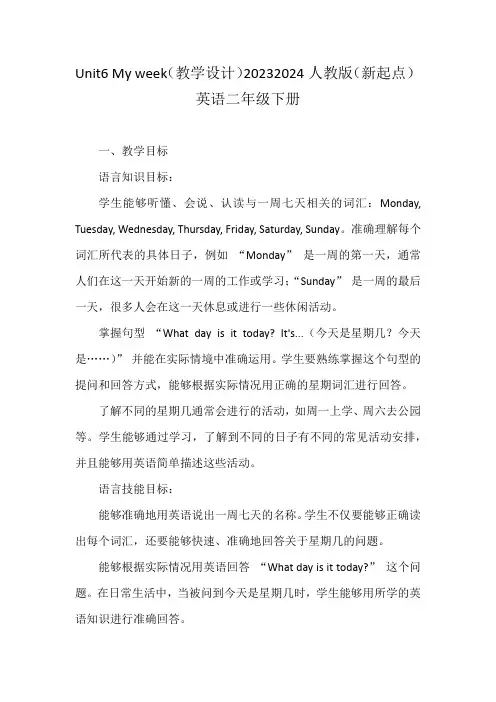
Unit6 My week(教学设计)20232024人教版(新起点)英语二年级下册一、教学目标语言知识目标:学生能够听懂、会说、认读与一周七天相关的词汇:Monday, Tuesday, Wednesday, Thursday, Friday, Saturday, Sunday。
准确理解每个词汇所代表的具体日子,例如“Monday”是一周的第一天,通常人们在这一天开始新的一周的工作或学习;“Sunday”是一周的最后一天,很多人会在这一天休息或进行一些休闲活动。
掌握句型“What day is it today? It's...(今天是星期几?今天是……)”并能在实际情境中准确运用。
学生要熟练掌握这个句型的提问和回答方式,能够根据实际情况用正确的星期词汇进行回答。
了解不同的星期几通常会进行的活动,如周一上学、周六去公园等。
学生能够通过学习,了解到不同的日子有不同的常见活动安排,并且能够用英语简单描述这些活动。
语言技能目标:能够准确地用英语说出一周七天的名称。
学生不仅要能够正确读出每个词汇,还要能够快速、准确地回答关于星期几的问题。
能够根据实际情况用英语回答“What day is it today?”这个问题。
在日常生活中,当被问到今天是星期几时,学生能够用所学的英语知识进行准确回答。
能够用英语描述自己在一周中某一天通常会做的事情。
例如,“I go to school on Monday.(我周一去上学。
)”“I play basketball on Saturday.(我周六打篮球。
)”情感态度目标:培养学生对时间的认知和管理能力。
通过学习一周七天的概念,让学生认识到时间的有序性和规律性,学会合理安排自己的时间。
让学生感受一周中不同日子的乐趣和意义。
每个星期几都有其独特的特点和活动,让学生体会到不同日子带来的不同体验,从而更加热爱生活。
培养学生的合作精神和交流能力,鼓励他们在小组活动中分享自己一周的活动。
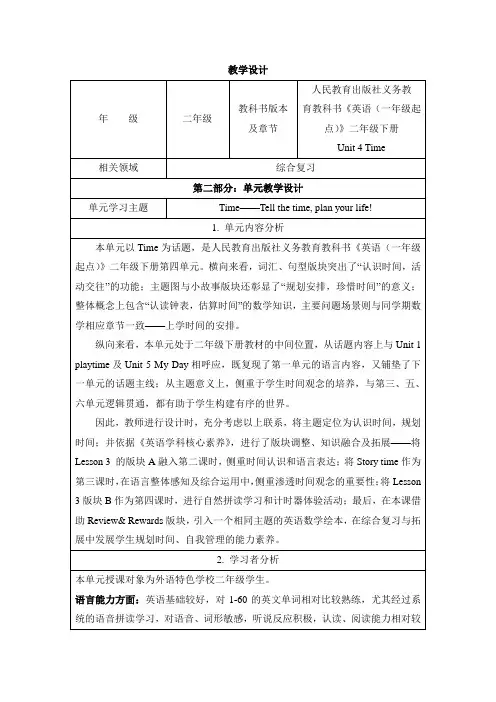
教学设计第三部分:课时教学设计课题Save time, plan your life!1. 指导思想与理论依据《英语课程标准》(2011版)强调语言学习的实践性和应用性,主张学生在语境中接触、体验和理解真实语言,鼓励学生通过体验、实践、探究等方式,发现语言规律,形成学习策略,发展自主学习能力。
这也正是英语学科核心素养所倡导的,即培养学生的“思维品质”(包括分析、判断等活动)和“学习能力”(如自主管理等)。
深度学习理念则将以上理论思想细化为具体条件,如学生主动参与;确立高阶思维发展的教学目标;整合意义联接的学习内容;创设真实情境及持续关注的评价方式。
因此,以不同任务激发学生主动参与发现、解决问题,从而发展自主管理能力;以合作探究引导学生发现语言规律,从而形成一定的思维品质;以真实情境整合学习内容及评价方式的意义联结,是设计本节课的基本理念。
基于上述理论依据,本课以“时间规划”为内容依托,通过绘本故事的阅读,使学生在帮助故事人物解决问题的过程中,复习再现“认识时间”的语言知识,在律,尤其是“几十”和“十几”的表达,并能类推到百以内数字单词,进而可以表达所有的时间(几点几分)2. 能够在故事情境中综合运用功能句型“What time is it'?"Its.”,并能够拓展Let's..”进行晨间活动的表达。
3. 能结合故事情境及讨论分享,理解“time line”(时间段)的概念,将“珍惜时间”的认知经验具体化为“如何”节约时间、合理规划,培养自我管理能力。
教学难点:1. 能结合故事情境及讨论分享,理解“tie1ine”(时间段)的概念,将“珍惜时间”的认知经验具体化为“如何”节约时间、合理规划,培养自我管理能力。
5. 教字过程与教学资源设计(可附教学流程图,含板书设计)教学流程教学过程Before-reading读前热身,复习导入1. 游戏猜谜,激趣热身,聚焦主题,复习旧知师生问候。
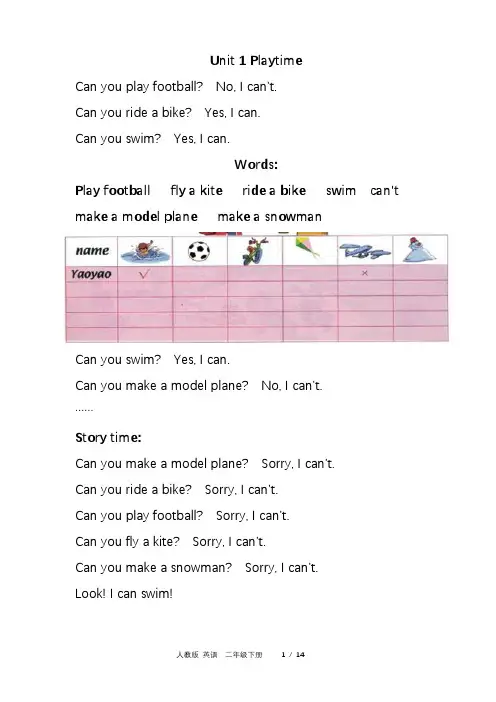
Unit 1 PlaytimeCan you play football? No, I can't.Can you ride a bike? Yes, I can.Can you swim? Yes, I can.Words:Play football fly a kite ride a bike swim can't make a model plane make a snowmanCan you swim? Yes, I can.Can you make a model plane? No, I can't.……Story time:Can you make a model plane? Sorry, I can't.Can you ride a bike? Sorry, I can't.Can you play football? Sorry, I can't.Can you fly a kite? Sorry, I can't.Can you make a snowman? Sorry, I can't.Look! I can swim!Songs:Bill can play football. Me too, me too. Yaoyao can fly a kite. Me too, me too.Joy can ride a bike. Me too, me too.Binbin can swim. Me too, me too.Andy can make a model plane. Me too. me too. Lily can make a snowman. Me too. me too.Can you play football? Yes, I can.Can you play football? Yes, I can.Can you play football?Can you play football?Yes, I can. Yes, I can. Yes, I can.Can you ride a bike? No, I can't.Can you ride a bike? No, I can't.Can you ride a bike? Can you ride a bike?No, I can't. No, I can't. No, I can't.Unit 2 WeatherWhat's the weather like today, Dad?It's sunny.Wow! Let's go and play football.What's the weather like in Shanghai? It's rainy.Words:rainy cloudy snowy windy sunny umbrella weather now cap let's wowWhat's the weather like today?It's rainy. No.It's windy. Yes.What's the weather like today?It's snowy. Let's make a snowman.……Story Time:What's the weather like?It's cloudy and rainy.I don't like rain. I love rain!Look, now it's sunny!Let's go to the park.Oh no! Now it's sunny.But it's windy. We can fly a kite.Do you want to go to the park? Yes, Let's go.I can fly a kite now! This is fun.Oh no, my cap!Songs:It's rainy. It's rainy.Umbrellas go up, up, up.It's cloudy. It's cloudy.Umbrellas go down, down, down.It's snowy. It's snowy.Umbrellas go up, up, up.It's windy. It's windy.Umbrellas go down, down, down.It's sunny. It's sunny.Umbrellas go up, up, up.Rain, rain, go away.Come again some other day.Little children want to play.Rain, rain, go away.Unit 3 SeasonsWhat's your favourite season? Autumn.What's your favourite season?Spring. It's warm and windy. I can fly a kite in spring.Words:Hot warm cool cold spring autumn summer winter favourite seasonWhat's the weather like in autumn? It's cool and windy.What's your favourite season?Spring. It's warm and windy. I can fly a kite in spring.Yaoyao, what's your favourite season?Summer, I can swim in summer.……What's your favourite season? Guess!What's the weather like?It's very cold. I can make a snowman in this season.It's winter. Yes!Story TimeIt's spring. Here are some peanuts for you. Thank you.Let's plant them. No, not me. I want to fly a kite. It's summer. Let's water the peanuts.No, not me. I want to swim.It's autumn. Let's pick the peanuts.No, not me. I want to play football.It's winter. Let's eat them.No, not you!No pain, no gain.Songs:Four seasons in a year.Spring, summer, autumn, winter.Warm in spring.Hot in summer.Cool in autumn.Cold in winter.Four seasons in a year.Spring, summer, autumn, winter.Spring is green, Summer is bright,Autumn is golden, And winter is white.Unit 4 TimeWhat time is it? It's 7:40.What time is it? It's 11:30.What time is it? It's 2:50.It's playtime. Let's play football.Words:time playtime start really late wineleven twelve thirteen fourteen fifteen sixteen seventeen eighteen nineteen twentythirty forty fifty sixty seventy eighty ninetyWhat time is it? It's 3:15. Let's……Wolf, wolf. What time is it? It's 3:00.It's playtime! Let's ride a bike.Story TimeWhat time is it? It's 11:00. Let's start.What time is it? It's 11:10.Let's play football.What time is it? It's 11:20. Let's fly the kite.What time is it? It's 11:30. Let's ride the bike.What time is it? It's 11:50.Oh, really? Oh, I'm late! I win!Songs:Tick tock, Tick tock, Goes the clock. It's eleven o'clock. Tick tock, Tick tock, Goes the clock. It's 11:20.Tick tock, Tick tock, Goes the clock. It's 11:30.Tick tock, Tick tock, Goes the clock. It's 11:40.Tick tock, Tick tock, Goes the clock. It's 11:50.Tick tock, Tick tock, Goes the clock. It's twelve o'clock.Hickory, dickory, dock!The mouse ran up the clock.The clock struck one,The mouse ran down,Hickory, dickory, dock!Unit 5 My DayWhen do you eat breakfast every day? At 7:10.When do you get up every day? I get up at 6:40.Words:every day get up eat breakfast go to school at eat lunch go home eat dinner go to bed whenWhen do you go to school every day?I go to school at 7:00.……I get up at 7:00 I eat breakfast I go to school at 7:40I play football at 3:00 I go home at 4:30I eat dinner at 6:00 I go to bed at 9:00Story TimeWhen do you get up, Monkey? I get up at 7:00.When do you eat breakfast? I eat breakfast at 7:20.When do you go to school? I go to school at 7:50.When do you eat lunch? I eat lunch at 12:00.It's 12:00 now!Oh no! It's time to go home!Songs:Every day, I get up, I eat breakfast, I go to school,I eat lunch, I go home, I eat dinner,I go to bed, Every day!When do you go to school, go to school, go to school? When do you go to school?I go to school at seven.When do you go home, you go home, you go home? When do you go home?I go home at four.When do you go to bed, go to bed, go to bed?When do you go to bed?I go to bed at nine.Unit 6 My WeekWhat day is it today? It's Sunnday.Great! Let's play football!What day is it today? It's Monday.Let's go to school!Words:Sunday Monday Tuesday Wednesday Thursday Friday Saturday today sad new meet childrenWhat day is it today? It's Thursday.What day is it today? It's Monday.What time is it? It' 7:30. Let's go to school.Story TimeIt's Monday. Mike is new in the class. He is sad.On Tuesday, Mike meets Bill. They play football.On Wednesday, Mike meets Lily. They fly a kite.On Friday, Mike meets Yaoyao. They ride bikes.On Saturday, Mike meets Andy and Joy. They swim.On Sunday, all these children are at Mike's birthday party. Mike is happy.Songs:Sunday, Monday, Tuesday, Wednesday, Thursday, Friday, Saturday.Sunday, lalala,Monday, lalala,Tuesday, lalala,Wednesday, Thursday, lalala,Friday, lalala,Saturday, lalala.That makes a week.。
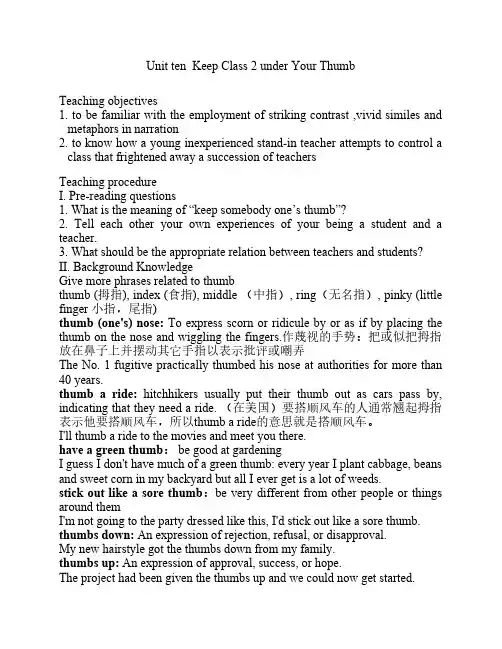
Unit ten Keep Class 2 under Your ThumbTeaching objectives1. to be familiar with the employment of striking contrast ,vivid similes and metaphors in narration2. to know how a young inexperienced stand-in teacher attempts to control a class that frightened away a succession of teachersTeaching procedureI. Pre-reading questions1. What is the meaning of “keep somebody one’s thumb”?2. Tell each other your own experiences of your being a student and a teacher.3. What should be the appropriate relation between teachers and students? II. Background KnowledgeGive more phrases related to thumbthumb (拇指), index (食指), middle (中指), ring(无名指), pinky (little finger 小指,尾指)thumb (one's) nose: To express scorn or ridicule by or as if by placing the thumb on the nose and wiggling the fingers.作蔑视的手势:把或似把拇指放在鼻子上并摆动其它手指以表示批评或嘲弄The No. 1 fugitive practically thumbed his nose at authorities for more than 40 years.thumb a ride: hitchhikers usually put their thumb out as cars pass by, indicating that they need a ride. (在美国)要搭顺风车的人通常翘起拇指表示他要搭顺风车,所以thumb a ride的意思就是搭顺风车。
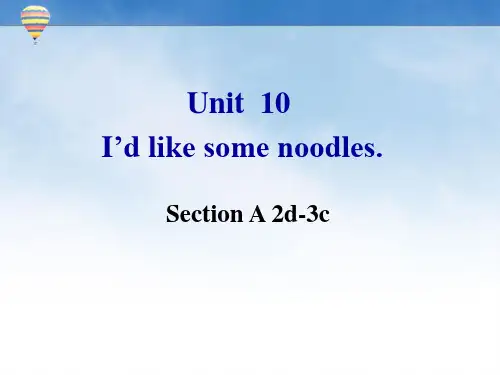
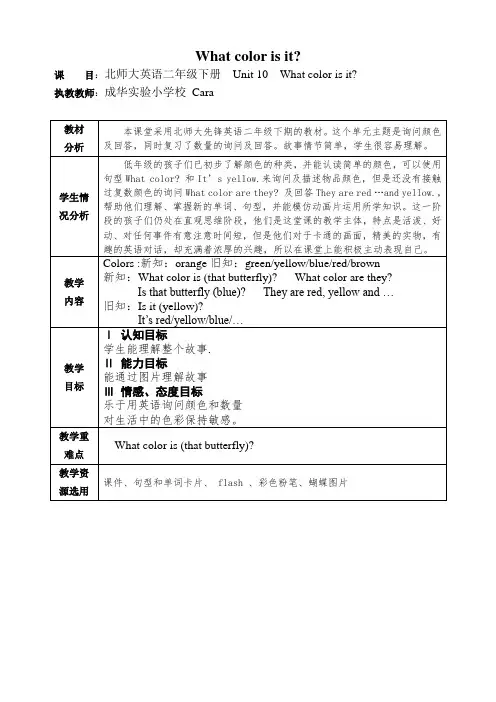
优派全优卷二年级上册下册英语人教新起点全文共3篇示例,供读者参考篇1My English Textbooks: A Journey Through "You Pai Quanyoupai"Hello, everyone! My name is Lily, and I'm a second-grader. Today, I want to share my thoughts about the English textbooks we use in class, called "You Pai Quanyoupai" (or "All-in-One Excellent Volume"). These books have been my faithful companions throughout this academic year, guiding me through the exciting world of English learning.First Semester: A Vibrant StartWhen the first semester began, I was thrilled to receive the first volume of "You Pai Quanyoupai." It was a colorful and inviting book, filled with engaging illustrations and fun characters. From the very first page, I knew I was in for an adventure!One of the things I loved most about this textbook was its clear and organized structure. Each unit had a specific theme, such as "My Family," "Colors and Numbers," or "My FavoriteToys." These themes were not only relatable but also helped me understand the practical applications of the language I was learning.The lessons were well-designed, with a perfect balance of listening, speaking, reading, and writing activities. I particularly enjoyed the dialogues and roleplays, which allowed me to practice my pronunciation and conversational skills. The accompanying audio materials were a great help, too, as they provided native speaker models for me to imitate.Another notable aspect of this textbook was its emphasis on cultural awareness. Throughout the units, I learned about different festivals, customs, and traditions from around the world. This not only broadened my horizons but also made me appreciate the diversity of cultures and ways of life.Second Semester: Building Upon FoundationsAs the second semester rolled around, I eagerly awaited the second volume of "You Pai Quanyoupai." And let me tell you, it did not disappoint!This book built upon the foundations laid in the first semester, gradually increasing the complexity of the language and introducing more advanced grammar concepts. However,the progression was smooth and manageable, thanks to the clear explanations and abundant practice exercises.One aspect that really stood out to me in this volume was the incorporation of project-based learning. Each unit culminated in a fun and creative project, such as creating a family tree, designing a dream house, or writing a short story. These projects not only reinforced the language skills I had learned but also encouraged me to think critically and creatively.The textbook also included a variety of supplementary materials, such as games, puzzles, and songs. These added an element of fun and enjoyment to the learning process, making it more engaging and memorable.Overall ImpressionsLooking back at the "You Pai Quanyoupai" textbooks, I can confidently say that they have played a crucial role in my English learning journey. The carefully curated content, engaging activities, and well-structured lessons have not only helped me develop my language skills but have also instilled in me a genuine love for the English language.I am truly grateful to my teachers and the authors of these textbooks for creating such a wonderful learning experience. As Ilook ahead to the next grade level, I feel well-prepared and excited to continue exploring the limitless possibilities that English has to offer.To my fellow students, I highly recommend embracing these textbooks wholeheartedly. They are not just books; they are gateways to a world of knowledge, adventure, and self-discovery. So, let's embark on this journey together and unlock the magic of the English language!篇2My English Textbooks: The Youpu Quanyoujuan for Second GradeHello everyone! My name is Xiaoming and I'm asecond-grade student here in China. Today, I want to share my thoughts about the English textbooks we use in class – the "Youpu Quanyoujuan" volumes for the first and second semesters of second grade. These textbooks are based on the "PEP New Starting Point" curriculum and published by People's Education Press.First of all, I really like the colorful and lively illustrations in these books. They feature cute characters like a friendly alien named Bao Bao and his pet dog Cucy. The pictures make thelessons more interesting and help me understand the stories and dialogues better. There are also lots of fun activities and games that make practicing English feel like playing rather than studying!The lessons in the first semester book start off fairly easy, reviewing things we learned in first grade like greeting people, introducing ourselves, talking about colors and numbers, and so on. But they quickly progress to teaching us new words and phrases related to topics like animals, food, family members, hobbies, and more. I've learned so many new English words this year!What I really enjoy are the stories and chants scattered throughout the book. The stories are about Bao Bao's adventures on Earth and always have a moral lesson or value like friendship, honesty, or perseverance. The chants are short rhymes or songs that are fun to recite and help me practice pronunciation and sentence patterns. My favorite one is the "How's the Weather?" chant!The activities and exercises in the book are quite varied too. There are listening exercises where we circle the picture that matches what we hear. Reading comprehension pages test our understanding of the stories. We also get to sing songs, act outdialogues, and even do crafts projects! The drawing and coloring activities are my favorite.One part I initially found difficult were the phonics sections that teach us letter sounds and word families. Things like distinguishing the "s" from "sh" sounds or pronouncing words with "-ation" endings. But my English teacher is really good at explaining these and giving us lots of practice. Now I'm much more confident with phonics!The second semester book continues building on the foundations from the first book. The themes get a bit more advanced, like learning about different countries, talking about schedules and routines, describing personality traits, and so on. But the lessons are still very student-friendly with engaging stories, games, and visuals.A new element I enjoyed were the cultural lessons that teach us about English-speaking countries and cultures. For example, we learned about BritishDoubleDeckers buses, Thanksgiving in America, and Wildlife in Australia. These were interesting glimpses into how people live in other parts of the world.There are also more project-based activities in the second book, like designing a poster about my family or making aschedule for my weekly activities. I found these hands-on projects really motivating and satisfying to complete.Overall, I feel the "Youpu Quanyoujuan" textbooks have been incredibly helpful for improving my English this year. The content is appropriately challenging yet understandable for kids my age. The multisensory approach with fun stories, lively pictures, songs, and activities makes English class something I look forward to every week.My English vocabulary and grammar have grown tremendously thanks to the structured progression of these textbooks. I can now understand and produce longer sentences about everyday topics. While I still have lots more to learn, I feel I've developed a solid foundation in English already.I'm really grateful to my hard-working teachers who make the textbook lessons engaging and relatable. They encourage us to practice speaking without fear, which has helped build my confidence. The textbooks themselves are well-designed instructional materials that align with the latest teaching methodologies.If you're looking for high-quality English textbooks for Chinese primary school students, I can definitely vouch for the "Youpu Quanyoujuan" series! They've helped me discover the joyof learning English through an interactive, multimedia,story-based approach. I'm excited to continue my English studies using these books next year.That's all from me for now. Thanks for reading my review and I'll see you next time! Goodbye!篇3My Thoughts on the "Youpai Quanyou Volume" English TextbooksAs a second grader, learning English is both exciting and challenging. The "Youpai Quanyou Volume" textbooks for English have been my trusty companions on this journey of language acquisition. These books, specifically designed for the second grade curriculum, have not only taught me the fundamentals of English but have also made the learning process enjoyable and engaging.The first thing that caught my attention was the vibrant and colorful illustrations throughout the books. Each unit is accompanied by delightful pictures that instantly capture our young minds. These visuals serve as powerful memory aids, helping us associate words and phrases with their correspondingimages. The illustrations also add a touch of fun, making the lessons feel more like an adventure than a chore.One aspect that I appreciate about these textbooks is their emphasis on phonics and pronunciation. The books introduce new sounds and letters gradually, allowing us to build a solid foundation in English pronunciation from the very beginning. The accompanying audio materials are particularly helpful in this regard, as they provide clear examples of how words should be pronounced. Listening to the audio recordings has helped me improve my speaking skills and develop a better ear for the English language.The content of the "Youpai Quanyou Volume" textbooks is well-structured and age-appropriate. The lessons start with simple vocabulary and gradually progress to more complex grammar and sentence structures. Each unit revolves around a specific theme, such as family, animals, or daily routines, making it easier for us to relate to the material and apply what we've learned to our own lives.One aspect that sets these textbooks apart is their emphasis on interactive learning. Throughout the books, we encounter various activities, games, and exercises that encourage us to actively participate in the learning process. From matching wordsto pictures to completing dialogues and role-playing scenarios, these activities not only reinforce our understanding but also make the lessons more enjoyable and memorable.Another strength of these textbooks is their focus on cultural awareness. Along with teaching us the language itself, the books also provide glimpses into different cultures and traditions. We learn about customs, festivals, and ways of life from around the world, broadening our horizons and fostering a sense of appreciation for diversity.Of course, like any textbook, the "Youpai Quanyou Volume" series has its challenges. At times, some of the vocabulary or grammar concepts can seem difficult, and we may need extra support from our teachers or parents. However, the books provide ample practice exercises and review sections, allowing us to reinforce our understanding and build confidence gradually.Overall, the "Youpai Quanyou Volume" textbooks have been invaluable resources in my journey of learning English. They have provided a solid foundation, made the learning process engaging and enjoyable, and opened my eyes to the richness of different cultures. As a second grader, I feel fortunate to have these books as my guides, helping me navigate the exciting world of the English language one step at a time.。